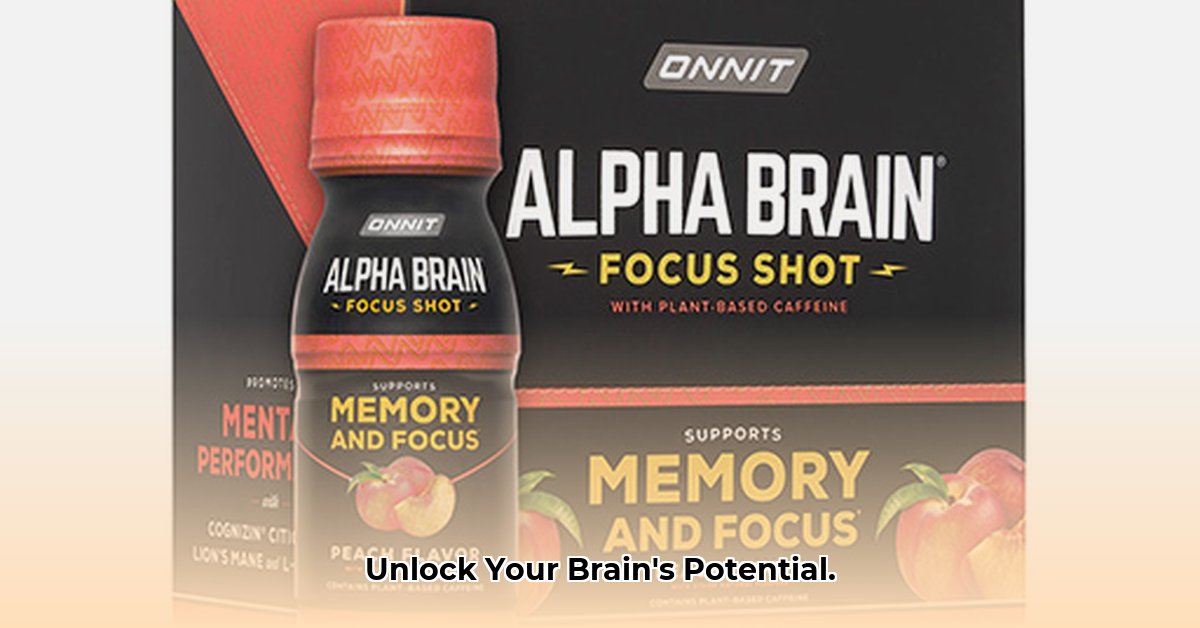Thinking about boosting your brainpower with a supplement? Let’s take a close look at Onnit’s Alpha BRAIN. This isn’t just another quick review; we’re diving deep into what’s actually in it, comparing it to other options, and giving you a simple guide on how to use it. We’ll look at what experts say, weigh the pros and cons, and even share some user tips. Whether you’re just curious or ready to try it, this guide will help you decide if Alpha BRAIN is right for you.
Alpha Brain Ingredients: A 2024 Deep Dive
Let’s talk about Alpha Brain – what’s inside, and what it might actually do. This isn’t your typical product review; we’re going to dig into the science (or lack thereof) and give you the tools to decide if it’s right for you, including insights into cognitive enhancers and focus supplements.
Decoding the Alpha Brain Formula for Brain Health
Alpha Brain’s ingredient list is what’s called a “proprietary blend.” Basically, the company doesn’t tell us exactly how much of each ingredient is in each capsule. While this protects their secret recipe, it also makes it tougher for independent scientists to verify their claims. Transparency is key when we’re talking about what we put in our bodies, right? So let’s look at the ingredients they do tell us about, one by one, and then we’ll discuss the bigger picture of holistic brain health. Understanding the components is crucial for assessing the potential cognitive benefits and optimizing your mental performance.
The Key Players: Alpha Brain’s Ingredients and Their Potential Benefits for Cognitive Enhancement
Here’s the lowdown on some of Alpha Brain’s key components, what they’re supposed to do, and how much the science backs it up, considering the impact of memory supplements:
- Alpha-GPC (L-Alpha glycerylphosphorylcholine): This ingredient is thought to boost levels of acetylcholine (a neurotransmitter crucial for memory and learning), a brain chemical crucial for memory and learning. Some studies suggest it might help with cognitive function. One study in Clinical Therapeutics found that Alpha-GPC improved cognitive performance in patients with Alzheimer’s disease. However, more research is needed to be sure, and dosages used in studies are often significantly higher than those found in supplements. A few people report mild queasiness, so starting with a small dose is a good idea.
- Bacopa Monnieri: This is an adaptogenic herb – meaning it’s thought to help your body cope with stress. It’s also believed to improve memory and ease anxiety. A meta-analysis published in the Journal of Alternative and Complementary Medicine found that Bacopa Monnieri improved cognitive function, particularly memory recall, in healthy adults. Anecdotal evidence and some studies suggest benefits, but again, more solid scientific research is needed. It’s usually well-tolerated, but keep in mind it could interact with some medications.
- Huperzine A: This one blocks an enzyme that breaks down acetylcholine. This could lead to improved brain function. A study in Acta Pharmacologica Sinica showed that Huperzine A improved cognitive performance in patients with mild cognitive impairment. However, it’s vital to be cautious, especially if you’re already on other medications that influence brain chemistry. Side effects like nausea and headaches are possible. Definitely talk to your doctor before using this. Long-term use of Huperzine-A is not well-studied.
- L-Theanine: Commonly found in green tea, L-Theanine is known for promoting relaxation without drowsiness. Research suggests it can enhance focus and cognitive performance, especially when combined with caffeine. However, Alpha Brain is caffeine-free, so the effects of L-Theanine may be more subtle. A study in the Journal of Nutritional Neuroscience found that L-Theanine improved attention and reaction time in healthy adults.
- L-Tyrosine: This amino acid is a precursor to dopamine and norepinephrine, neurotransmitters involved in motivation and focus. Some studies suggest L-Tyrosine can improve cognitive function under stressful conditions. However, the impact on cognitive enhancement without the presence of stress is less clear. Research published in the Journal of Psychiatric Research indicated that L-Tyrosine could improve cognitive flexibility and reduce the negative effects of stress on cognitive performance.
- Cat’s Claw Extract (Uncaria tomentosa): While traditionally used for its immune-boosting properties, some research suggests that Cat’s Claw extract may also have neuroprotective effects. A study in the Journal of Alzheimer’s Disease found that a specific extract of Cat’s Claw, called AC-11, reduced DNA damage and neuroinflammation in vitro. More research is needed to confirm these potential cognitive benefits in humans.
The Proprietary Blend: A Blessing and a Curse for Nootropic Effects?
This undisclosed mix of ingredients is a bit of a double-edged sword. On one hand, it might allow for ingredients to work together in ways a simple mix wouldn’t. On the other, it makes it hard to know exactly what each ingredient is contributing. It makes it really tough to get independent verification that it works as advertised. Experts often recommend opting for supplements with transparent ingredient lists and dosages to ensure you know exactly what you’re consuming.
Alpha Brain: Weighing the Pros and Cons for Mental Performance
It’s always good to look at both sides of the coin. Here’s a balanced look at the potential upsides and downsides of this focus aid:
| Pros | Cons |
|---|---|
| Some users report improved focus and concentration | The secret ingredient list makes independent verification difficult. |
| Comes in different forms (capsules, etc.) | It’s a relatively expensive supplement compared to others on the market. |
| Doesn’t contain caffeine | Long-term safety data is limited; everyone reacts differently. |
| Some studies support certain individual ingredients | Potential side effects, though generally mild and temporary. |
| Onnit offers a money-back guarantee for first-time users | Dosage of key ingredients within the proprietary blend is unknown. |
Getting the Most Out of Alpha Brain (If You Decide to Try It) for Enhanced Focus
Here’s a step-by-step guide to using Alpha Brain safely and effectively:
- Start Small: Begin with a lower dose than the label suggests to see how your body reacts. For instance, begin with one capsule instead of two.
- Listen to Your Body: Pay attention to how you feel. If you experience any unexpected effects, stop taking it and talk to your doctor.
- Explore Alternatives: If Alpha Brain doesn’t work for you or you find it too pricey, many other cognitive-enhancing supplements are available. Look for supplements with transparent ingredient lists and dosages.
- Chat With Your Doctor: This is especially important if you’re already taking other medications or have any health concerns.
- Manage Your Expectations: No supplement is a magic bullet. It’s unlikely to produce dramatic, overnight results. Expect subtle improvements, if any. A realistic perspective is critical for managing your expectations.
- Don’t combine with other cognitive enhancers without medical advice: Mixing Alpha Brain with other nootropics or medications can lead to unpredictable interactions and potential adverse effects.
The Whole Picture: It’s More Than Just a Pill for Brain Health
While Alpha Brain’s ingredients may offer some benefits, remember they’re just one piece of the puzzle. Your diet, exercise, sleep quality, stress levels, and overall lifestyle all play massive roles in brain health. A healthy lifestyle is far more likely to make a long-term difference than any single supplement. Think of Alpha Brain as a supporting player, not the star of the show, offering a subtle improvement in mental clarity. Studies show that regular physical activity, a balanced diet, and sufficient sleep are more impactful on cognitive function than any single supplement. Ongoing research is needed to confirm its full effects, and individual responses will vary. Always consult your doctor before adding any new supplement to your routine.
How to Mitigate Alpha Brain Supplement Side Effects for Safe Consumption
Key Takeaways:
- Alpha Brain, a popular nootropic supplement, blends several ingredients to allegedly enhance cognitive function. However, the effectiveness of this proprietary blend requires further research.
- While some individual ingredients show promise in isolated studies (like L-Theanine and Bacopa Monnieri), the overall impact of the combined formula remains uncertain due to a lack of comprehensive clinical trials.
- Reported side effects vary, highlighting the need for individual caution and a careful approach.
- How to mitigate Alpha Brain supplement side effects involves understanding potential risks, starting with low dosages, monitoring your body closely, and consulting healthcare professionals.
Understanding Alpha Brain’s Ingredients and Their Potential Impacts on Memory and Focus
Alpha Brain isn’t just one thing; it’s a complex mixture of various compounds. Each ingredient has its own potential benefits and drawbacks. For example, Huperzine A, a potent cholinesterase inhibitor (a substance that prevents the breakdown of acetylcholine), can boost acetylcholine levels, potentially improving memory and focus. But too much can lead to headaches, nausea, or even more serious issues. Similarly, L-theanine, known for its calming effects, rarely causes problems, but it can interact with certain medications. The problem? On
- Why Am I Always Thinking About Food? Your Body and Brain Explain - February 2, 2026
- Healthy Eating Is About Quality, Not Just Calories - February 1, 2026
- Healthy Living Products to Elevate Your Wellness Routine - January 31, 2026










